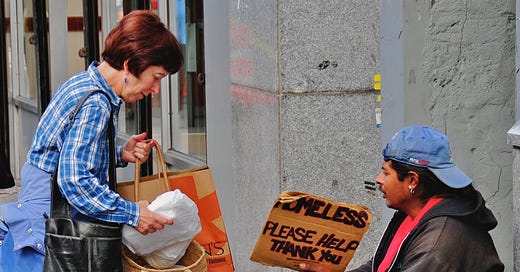‘Poverty Is a Choice’
There's no denying it: There is no necessity that says that 140 million people have live a hand-to-mouth existence in the richest nation on Earth
Let's try a thought experiment.
Stop and think about the 140 million Americans who either live in poverty or live in such hand-to-mouth circumstances that they're living close to poverty.
You know, the kind of living paycheck-to-paycheck sort of existence that often forces folks into “no-win” situations like having to drive an old, unreliable car, and when they need a car repair, say, that'll cost even $500 to $700, that's cause for a major financial disaster.
These are the folks you may have heard about who cannot successfully manage a financial emergency of even $400.
Now think about those folks, Americans like you and me who very well find themselves in these precarious situations for no reason other than what life dealt them — and now think about the fact that these folks are having to live like this in the richest nation on Earth.
Now, people like this often are working. In fact, it's so common that we have a name for folks like this: the “working poor.”
So think about that.
Why, in the United States of America, should the expense of a new ignition coil, spark plug replacement — or an unexpected bill from a trip to taking an ailing child to the doctor — be what tips another human being into a financial, and ultimately personal, abyss?
Is there some immutable necessity that will make it so?
Some immovable law?
If you really think honestly about these questions, you are likely to come to the same conclusions as Reps. Pramila Jayapal (D-Wash) and Barbara Lee (D-Calif), and the folks with the Poor People’s Campaign, led by Rev. Dr. William Barber II and Rev. Dr. Liz Theoharis.
“Poverty exists because we allow it to exist. In the wealthiest country in the world, 140 million people are poor because we have chosen to allow it to be so,” said Congresswoman Jayapal. “We have the power to end poverty.”
So, in coordination with the Poor People's Campaign, Reps. Jayapal and Lee have unveiled a congressional resolution that demands the United States fully address poverty and low wages “from the bottom up.”
Titled “Third Reconstruction: Fully Addressing Poverty and Low Wages from the Bottom Up,” the resolution is dubbed a historic omnibus vision to summon the moral and political resolve of the nation to center the needs of the 140 million people who are poor, low-wealth and/or living one emergency away from economic ruin – and millions more since the pandemic – with “moral laws and policies.”
“We are facing a poverty crisis on top of a public health crisis that is disproportionately impacting communities of color and low-income communities,” said Congresswoman Lee. “It’s past time that we address the historical injustices of structural racism and economic inequality and center the needs of the millions who have fallen into poverty just since the start of this pandemic. As Co-Chair of the Majority Leader’s Task Force on Poverty and Opportunity, I am proud to unveil this transformative legislation with Congresswoman Pramila Jayapal and work alongside the Revs. Barber and Theoharis to dismantle the systems that have perpetuated poverty and low wages in this country for generations.”
The resolution aims to:
Protect American democracy through expanding voting rights, comprehensive and just immigration reform, guaranteeing Native and indigenous rights; addressing the war economy; and guaranteeing adequate incomes, living wages and the general welfare;
Prioritize the needs and demands of the 140 million people who are poor or one health care crisis, job loss, storm or emergency away from economic desperation, with policies that build up from the bottom, including around housing, healthcare, welfare, water, and equitable high-quality and diverse public education;
Update the poverty measure to reflect what it takes to secure a decent standard of living today as a new baseline for anti-poverty and social welfare programs;
Develop a federal jobs program that prioritizes poor and low-wealth communities — both urban and rural — to address racial and wealth inequality and build up public infrastructure through socially beneficial and climate resilient jobs and development;
Raise resources to invest in these priorities by redirecting military spending and carceral spending, implementing fair taxation and being willing to use deficit spending.
“This resolution realizes that we must simultaneously deal with the interlocking injustices of systemic racism, poverty, ecological devastation and the denial of health care, militarism and the distorted moral narrative of religious nationalism that blames the poor instead of the systems that cause poverty,” said Rev. Theoharis.
This legislation draws on the history of the first Reconstruction following the Civil War and the second Reconstruction of the civil rights struggles of the 20th century and addresses the converging injustices of systemic racism, poverty, public health inequity, militarism, white supremacist nationalist extremism, and aims to lift our society and economy from the bottom up.
To read the full text of the resolution, click here.




